Secure your scholarship offer in just 2-3 days through December 17! Get started.
90% of applicants who apply by the priority deadline receive scholarship support. Apply now!
Now accepting applications for Fall 2026. Apply now!
Secure your scholarship offer in just 2-3 days through December 17! Get started.
90% of applicants who apply by the priority deadline receive scholarship support. Apply now!
Now accepting applications for Fall 2026. Apply now!
This article is an excerpt from a longer story published in the University of Denver Magazine. Read the full version at https://stories.du.edu/magazine/
With guidance from Korbel professor Keith Gehring, grad student Raluca Alexandrescu turned a bold idea into a Fulbright-winning project and a life-changing experience.
When Raluca Alexandrescu first began her Fulbright application, she wasn’t sure she would qualify, let alone stand out in a field of top-tier candidates. A graduate student in information technology with a focus on AI strategy, she had a vision: to return to Romania, her home country, and study how small businesses in Bucharest could better adopt digital tools. But translating that vision into a competitive proposal would take more than hard work. It would take clarity and perseverance—and the right mentor.
Enter Keith Gehring, a teaching associate professor at DU’s Josef Korbel School of Global and Public Affairs. Gehring—who was recently awarded a Fulbright grant himself and will go to Serbia in March to teach data forecasting—had served on Fulbright review panels before. When he read Alexandrescu’s proposal, something struck him.
“It was immediately clear to me that Raluca had something to say, and there was a sincerity behind her project,” he says. “So, I wanted to help her articulate her vision in a way that would resonate for the reviewers.”
Gehring views serving as a reviewer as paramount to his role as an educator. “If we can’t be a bridge to what our students want to do next, that’s a missed opportunity,” he says.
Alexandrescu had already submitted her application when Gehring first met her as a panelist on her campus interview. Afterward, he offered to help her refine it, and the two began meeting one on one, with Gehring pushing her to sharpen her focus and define her audience.
“What really stood out for me was that Keith’s feedback was both critical and encouraging. Maybe for some people that’s not important, but for me, it meant everything.”
Raluca Alexandrescu, graduate student
“What really stood out for me,” Alexandrescu says, “was that Keith’s feedback was both critical and encouraging. Maybe for some people that’s not important, but for me, it meant everything. He was the first person since I’ve been back as a graduate student who genuinely cared and wanted me to succeed.”
Alexandrescu’s project proposal—to explore the digitalization gap facing small businesses in Romania—was deeply personal. Having spent much of her life in the U.S., she saw the Fulbright program as a way to reconnect and give back.
“I’ve been going back and forth to Romania more lately, but I haven’t been able to really stay,” she explains. “I feel like I’m part of both worlds, and this is a way to be a bridge—to open opportunities, build relationships, and maybe help Romanian businesses take advantage of AI and innovation.”
That sense of purpose didn’t go unnoticed. For Gehring, Alexandrescu’s sincerity was exactly what Fulbright aims to support.
“There’s an intangible we look for—sincerity of purpose,” he says. “In Raluca’s case, it wasn’t just about researching digitization. It was about being a bridge between her home country and the U.S., using her skills to expand opportunity. That kind of vision matters.”
Eventually, the news came that Alexandrescu had been awarded a Fulbright. She was abroad when she found out and remembers bursting into tears.
“I just started crying, and I felt so much joy in my heart,” she says. “It confirmed how much I really wanted this.”
Gehring, too, remembers the moment he got her message—while attending his own child’s high school graduation in DU’s Magness Arena.
“I was sitting there as all the students were walking across the stage, and I thought, ‘Wow, in front of me are all these kids with future potential, and here is Raluca, someone who is realizing her potential and whose future is unfolding right in this moment.’”
For both mentor and mentee, the experience reinforced the value of connection and persistence.
“Mentorship doesn’t have to be formal,” Gehring says. “Sometimes it starts with a hallway conversation or an office hours visit. And if I’m not the right fit, it’s my job to point a student to someone who is.”
Alexandrescu agrees. “Keep at it,” she advises other students looking for a mentor. “Keep knocking on doors and asking questions. It can take time to find the right person, but don’t get discouraged. Surround yourself with people who see your potential.”
This reflection was written by Madison Bryant (MA, Global Economic Affairs, 2026), a first-year Korbel graduate student partaking in a simulation for the class, "Great Issues in International Affairs."
This Fall Quarter, my graduate cohort of over 100 students came together for an engaging simulation exercise that reminded me why I came to Korbel in the first place. Having the opportunity to get hands-on experience like this in class is such a unique experience, especially when all of your classmates are passionate about the same issues and bring different perspectives.
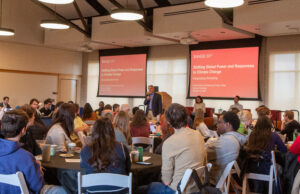
The simulation was part of our Great Issues in International Relations course, a class most first-year graduate students at Korbel take in their first fall quarter. It’s an exciting course that introduces us to the field and multiple faculty members. This quarter, the simulation happened in collaboration with Korbel’s own Pardee Institute and the Bertelsmann Foundation’s Range Forecasting, which meant we got to learn from experts in the field of forecasting. Dean Fritz Mayer addressed us before the simulation began, explaining how forecasting has always been a cornerstone of Korbel’s education. After learning a little bit about what Range does, we were split into ten discussion groups to discuss how trends in the “great issues” – globalization, nationalism, inequality, and democratic backsliding – could impact climate change response.
This simulation allowed me to connect with peers in other degree programs and interact with students with different perspectives to reflect on climate change solutions. While I sit next to different students every Monday morning, it was a different experience collaborating with them and learning from them, which I found to be the best part of the day.
In our groups, we assessed what signs would indicate one of three scenarios related to international cooperation for solving climate change. The scenarios highlighted the connection between climate change and inequity in development, with the third scenario being international policy moving to solve both climate change and underdevelopment. Finally, we used the Range forecasting platform to answer: “Will developed countries deliver $200 billion USD or more in financing to developing countries for climate action between January 1, 2026, and December 31, 2026?” This question required reflecting on our discussion and our readings for the week to determine the signs that this could happen. After using the platform to individually decide what we thought the probability was, we got to read through everyone else’s perspectives. My cohort spans multiple home countries and undergraduate degree programs, so it was exciting to see how people’s perspectives came through in their reflections.
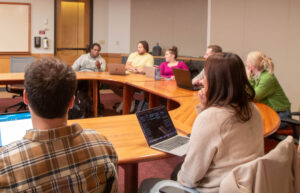
Thanks to all of our discussions, I got a better grasp on modern global governance and climate change solutions. Post-graduation, forecasting skills will give any student, regardless of degree program, a competitive edge. Overall, forecasting skills and experiences like these are among what set Korbel graduates apart and allow us to have careers working to minimize harm across all our fields. I’m grateful for this opportunity, especially right away, given how many other first-year graduate students there are. This experience was engaging and informative, and made me look forward to every opportunity that I will have throughout my program.
Each spring, Professor Janney Carpenter’s Social Impact and Sustainability Lab offers students a unique opportunity: ten weeks of hands-on project work that connects classroom theory with engaged community work. Within the first few seminars, students are introduced to leaders from local and global institutions that face real-world challenges, like nonprofits, funders and impact investors, and other social enterprises. Soon after, students partner with these organizations, gaining hands-on experience that often kicks off a new career with renowned institutions like the American Red Cross, the Gates Family Foundation, and others.
This class’s designation as a “lab” is a meaningful one. The stakes are real, the deadlines matter, and the work students produce doesn’t sit on a shelf. It influences how organizations make decisions about sustainability, funding, and community impact.
“I come up with students’ projects by working with the client ahead of time,” Professor Carpenter said. “I develop a scope of work for each project and then present everything to the students. They rank which ones they like the most. Then, I put them into teams, which gives them about eight weeks of project work.”
With Professor Carpenter’s scope of work in hand, students develop a plan together and communicate directly with the client. Most of the time, their projects involve systems mapping, which tasks students with understanding how the organization works and identifying key stakeholders, partners, and obstacles. Current Korbel graduate student Aidan Smith, who recently shared his experience as an AmeriCorps fellow, used this class to interview internal staff at the American Red Cross.
“Aidan and his team partner did interviews locally,” Professor Carpenter said. “They spoke with Veterans Affairs (VA) offices for the Red Cross, and they identified an issue I’d never considered. The VA was going digital, moving all appointments and announcements online. But that was excluding people who were less digitally inclined, particularly seniors. Aidan and his partner figured that out and became part of the solution. They connected the VA with nonprofits who specialize in helping seniors get more comfortable with digital tools.”
Aidan’s story is one of many. Another graduate student and AmeriCorps fellow, Kip Newman, worked with the African Community Center — a refugee resettlement organization — by helping them grapple with new funding challenges under the current administration. Others worked with a D.C.-based B Corp, Cambium Carbon, to help create a supply chain that transports chopped wood from cities into a supply chain that turns trash into recycled products. The scope of these projects highlights the many paths that students can take, and with Professor Carpenter at the helm, every project leaves a tangible mark on the organizations and communities they serve.
Before joining Korbel as an adjunct professor, Professor Carpenter started at JPMorgan in Corporate Finance. She eventually took those skills into three decades of consulting work at the intersection of finance, philanthropy, sustainability, and education. As an expert in all these fields, she knows firsthand what today’s organizations need from emerging professionals.
“I teach students to ask the right questions in these spaces, which isn’t easy,” she shared. “How do you balance social or environmental impact goals with financial sustainability? How can organizations develop strategy with insights and feedback from customers and communities? How can you align strategy with available funding resources? How do you choose and measure the indicators of progress? All organizations need data for continual learning so they can adapt to changing market conditions and client needs.
But Professor Carpenter insists those challenges mirror the realities of social impact work. One common revelation for students is that scaling an organization — particularly a nonprofit — isn’t always about growth. “There are lots of ways to scale impact,” she said. “It could be increasing awareness, sharing information to inform policy decisions, or finding corporate funding partners.”
Based on her course evaluations, Professor Carpenter shared the biggest takeaway students often have: “You don’t design the best solutions in a conference room. You do it by going out there and talking to people. That’s what this class helps students do, sometimes for the first time. Building the communities you want to see starts by being a part of them.”
The Social Impact and Sustainability Lab is a prime example of what makes Korbel distinctive: rigorous academic training that’s applied to solving real problems with practitioners in the field. Learn more about our master’s programs to see how you can gain the skills to make a greater impact in your career and community.
For nearly three decades, the International Career Advancement Program (ICAP), proudly hosted at the Aspen Institute, has stood at the forefront of building a stronger American leadership presence in international affairs and public policy. ICAP is a community, a catalyst, and a promise, which firmly believes that the United States will be stronger and more effective on the world stage when leadership is cultivated with excellence and vision.
What began in 1997 at the Josef Korbel School of Global and Public Affairs, as an initiative led by Dean Emeritus Tom Rowe, has grown into one of the nation’s most respected professional development programs, one that changes careers, transforms lives, and strengthens our country’s global impact. At its core, ICAP was created to open doors for mid-career professionals across government, nonprofit, and private sectors, and it continues to do so today.
“Most career development programs offer a sense of personal growth, but ICAP gave me more than that. It offered me a sense of motivation and purpose, gave me insights into my leadership style and was instrumental in getting me across the threshold into executive roles.”
- Amb. Carmen Cantor, ICAP Fellow 2012
ICAP fellows step into the program with the opportunity to gain mentorship from accomplished senior leaders, career advising, and a platform to engage with pressing policy challenges. Beyond that, the program creates a rare space to openly discuss personal and professional challenges, explore solutions with peers facing similar issues, and discover alternative leadership and management styles. Set in Aspen’s reflective mountain landscape, ICAP offers a transformative experience that blends leadership development, values-based career coaching, and policy dialogue with intentional opportunities for self-care and reflection. ICAP fellows build lifelong friendships and professional ties, supported by 20–30 mentors and career advisors, and join a growing global network of over 900 alumni through the ICAP Fellows Association. Together, this holistic approach equips fellows not only with the tools for immediate growth, but also with a lifelong community dedicated to mutual support and leadership excellence.
“I really enjoyed my time at ICAP Aspen! Going into it, I was intimidated by the caliber of professionals and experts in the room. But as I got to know them, I realized they were some of the most down-to-earth people who genuinely cared about my success.”
- Victory, Korbel Graduate Assistant for ICAP; MA, International Security, 2027
At its core, ICAP believes that America’s leadership is strongest when it draws on the full talent, creativity, and dedication of its people. Year after year, the caliber of ICAP Fellows proves this true. From Ambassadors and White House appointees to CEOs, nonprofit executives, and founders of innovative ventures, ICAP alumni have become leaders whose voices shape global affairs with distinction.
Each year, ICAP selects a highly competitive cohort of 30–40 mid-career professionals. Together, they begin their journey in Washington, D.C., before traveling to Aspen, Colorado, where the mountain setting provides space for reflection and growth. While the week-long retreat is the heart of the program, fellows also join the ICAP Fellows Association, a vibrant network of more than 900 alumni who remain deeply connected, offering long-term support and collaboration.
The impact speaks for itself. ICAP has been recognized by The Economist magazine as among the top 10 Diversity Networks globally. Its fellows now serve at the highest levels of government, in boardrooms, classrooms, and across the global stage. Graduate students at the Korbel School also benefit, serving as ICAP interns and assistants, gaining invaluable exposure to leaders who inspire and guide them.
As ICAP looks ahead, one truth remains clear: the demand for thoughtful, ethical, and capable leadership in global affairs has never been greater. And ICAP will continue to rise to meet that need, empowering leaders today to shape a better tomorrow.
Learn more about ICAP here.
From the steel city of Pueblo, Colorado to the halls of government, recent Korbel alumnus Jacob Topping’s journey is a testament to what drive, purpose, and community roots can make possible. A proud first-generation college graduate, Jacob grew up with a strong belief that people from small towns deserve a voice in decisions that shape their future. After graduating with his Master of Public Policy (MPP) in 2024, Jacob has dedicated his career to elevating those voices. “I was born and raised in Pueblo,” he shared, “and I am now the Southeastern Regional Representative for Senator Michael Bennet.”
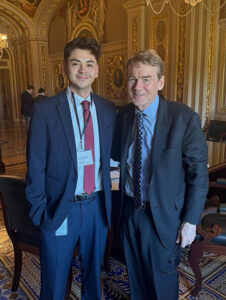
Jacob sat down for an interview while on the road with the Colorado (CO) Project, a community effort led by the Scrivner Institute of Public Policy to build a state platform for deliberation on issues affecting Colorado. This is one of many initiatives where he gives back to his community. As a kid in Pueblo, he developed a lifelong desire to serve, always believing that public policy isn’t something that happens far away. It affects real people, real families, and real communities like his.
Yet ambition alone wasn’t enough. Jacob knew he would have to build his path step by step by expanding his skillset and growing his professional network. That’s what drove him to Korbel.
Pueblo Roots, Public Service Goals
Jacob’s pride in his Pueblo roots is central to who he is. His hometown shaped his values, work ethic, and determination to pursue a career that could make a difference, prompting him to first imagine a career in government as a high school senior. The spring before graduation, his school district went on strike. For most students, it was a disruption; for Jacob, it was an awakening. “That was my first dip in the waters of the political side and governance side of local policy,” he recalled. “Seeing how that really impacts not only our educators but our students in the district definitely sparked my fire for this world.”
From there, the idea of public service never left his long-term plans.
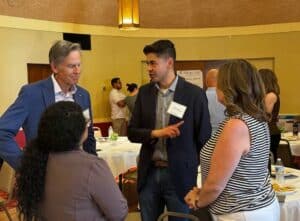
Growing up in Pueblo reinforced Jacob’s sense of responsibility to his community. His parents ran a small business, which gave him an early education in hard work and the importance of showing up for others. “I’ve always been in touch with the community down there,” he said. “Learning the values of hard work definitely informed my long-term career aspirations. I think that’s why I ended up in the role that I did.”
Today, Jacob’s role with Senator Michael Bennet allows him to work not only in Pueblo but across southeastern Colorado, connecting residents, counties, and nonprofits with resources and opportunities. Every day, he draws on the lessons he learned growing up: hard work, community responsibility, and the value of showing up for others. He wants to help shape policies and programs that make a tangible difference in people’s lives. For Jacob, public service isn’t just a career; it’s a way to give back to the place that first inspired him to imagine what’s possible.
From Classroom Connections to Real-World Impact
When Jacob arrived at Korbel for his MPP, he found a community eager to provide support and open doors, helping him secure his post-graduation career in Senator Michael Bennet’s office.
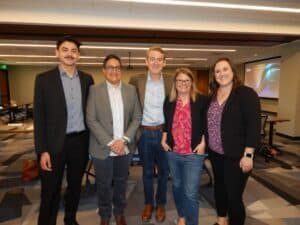
Jacob attributes much of his success to the faculty mentorship he received during his program, particularly from Professor Naazneen Barma. “Dr. Barma was a tremendous asset in my academic endeavors,” he said. Through her guidance, he also became involved with the CO Project, strengthening his connection to Senator Bennet and introducing him to more of Colorado’s public servants and their passion for community work. This year’s CO Project initiative—CO Project 2.0: Rural Renaissance—is a community-led effort to shape the future of Colorado through its rural communities, like those in the Southeastern Region where Jacob now works.
Between participation in the CO Project, and mentorship from faculty like Dr. Barma, Jacob graduated feeling prepared to launch a career of impact. “The MPP degree set me up perfectly for this role with Senator Bennet,” he said. “I came in as a first-generation student, and having the full support of not only the faculty but the community at Korbel is definitely something that I leaned on a lot.”
Korbel’s support—both during his studies and after graduation—has remained a constant, providing the skills, relationships, and resources that allow him to thrive in public service
A Full-Circle Moment
Now, in his full-time role with Senator Bennet, Jacob covers southeastern Colorado counties, helping communities access resources and advancing legislative priorities. “Working for Senator Bennet has given me a new perspective on the real, on-the-ground impact we can have in communities like Alamosa County, Pueblo County, or out east in Prowers County,” he says. “Being able to be a real champion for rural Colorado is definitely something that I’ve been able to really appreciate in this role.”
Looking back, Jacob sees his career path as a return home, literally and figuratively. “My first internship experience was during undergrad when I was a student at CSU Pueblo, back in Senator Bennet’s office in 2019. So, this is almost as full circle as you can get,” he said with a smile.
For Jacob, what makes the journey meaningful is not just the professional milestones, but the chance to serve the community that raised him. While Korbel gave him the skills and connections to do that, Pueblo gave him the values to keep going.
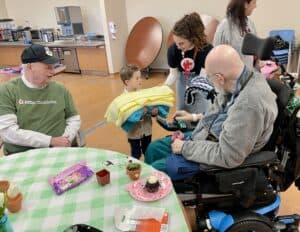
For alumnus Abigail (Abby) Russell, her job at the American Red Cross is the extension of a career that began in graduate school. “I was in the dual degree program,” Abby recalled. “I did a Master’s in Social Work and a Master’s in International Human Rights. And because I also completed Korbel’s Humanitarian Assistance Certificate, I needed internship hours for all three.” Her solution? To use the Korbel School’s Office of Career and Professional Development (OCPD) to facilitate an introduction to one of the world's most renowned humanitarian organizations. That conversation with the Red Cross was the catalyst for a career of community-driven impact.
As a graduate student, she worked with the Red Cross’s Disaster Cycle Services department, but her internship quickly evolved. “The director of the Service to the Armed Forces and International Services department found out about me and asked me to join her team, too,” Abby said. “She gave me all the training I needed to teach international humanitarian law, which became my second role there.” Abby ended up balancing two Red Cross internships across different departments, applying her dual training in real-time.

At the University of Denver’s School of Social Work, Abby would make another pivotal career move. She joined a faculty-led program called the Bosnian Transition, which was designed to be an immersive, short-term educational trip. But after learning so much about Bosnia during her time working under the School of Social Work’s Professor Ann Petrila, she decided to stay. “I packed everything up, left Denver, and moved to Bosnia without a job lined up. I just knew I wanted to be part of that community long-term.”
Within weeks, she was working with the Srebrenica Memorial Center and a women’s empowerment organization called Nahla. And when Professor Petrila brought new student groups to Bosnia, Abby stepped in as a field supervisor. “It was my first time officially mentoring graduate-level interns,” she said. “It’s not just about helping them complete tasks, it’s about supporting their professional development, connecting them to the local context, and continuing to guide them after the internship ends.”
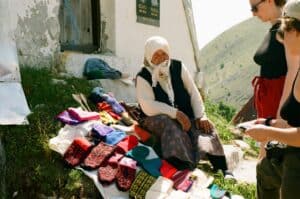
When Abby moved back to Colorado, her previous experiences facilitated by Korbel and the School of Social Work made her a shoo-in for full-time work with the Red Cross. Today, she’s the regional program manager for the local Colorado and Wyoming office, helping with their national effort called Community Mobilization. “We’ve been working on networking, expanding, and adapting our programs to fit into local communities across the United States better,” she said. “And then mobilizing those communities to be more independent and self-sustainable.”
Abby also supervises Korbel students who are interning with the Red Cross through the AmeriCorps internship program. “When I was first asked to supervise AmeriCorps interns, I said yes immediately,” Abby said. “It felt like a perfect opportunity to give back, not just to Korbel and the Red Cross, but to the next generation of humanitarian professionals.”
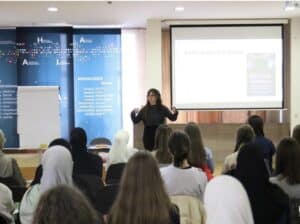
That full-circle moment—going from intern to supervisor, student to mentor—reflects the real-world impact of a Korbel education. Abby’s story shows that graduate study at Korbel isn’t just about academic theory. It’s about building the skills, relationships, and values that lead directly to global careers.
For prospective students wondering whether Korbel is the right fit, Abby offers a clear answer: “The support is always there. From faculty mentors to internship connections, I never felt alone. If you’re driven to make a difference, locally or globally, Korbel opens the doors. You just have to walk through them.”
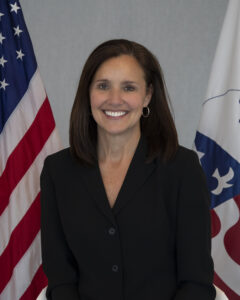
As Professor Carol Spahn prepares for her first quarter at Korbel, it’s no secret that international and public affairs face uncharted waters. But as Former Director of the Peace Corps during the COVID-19 pandemic, Professor Spahn’s expertise is leadership during uncertainty.
When explaining her approach to leadership, she offers a simple but powerful metaphor she picked up on a Colorado rafting trip: point positive. “Look at where you want to go, not at the rocks you want to avoid. Progress requires hope and your individual actions matter. Over time, they add up to something much bigger than yourself.”
That mindset — focusing on possibility rather than the rocks you want to avoid — has defined Spahn’s approach to leadership throughout her career. As the new Rice Family Professor of the Practice of International and Public Affairs, Professor Spahn brings the full weight of a career defined by bold leadership and global service. When the COVID-19 pandemic struck, Spahn — then Chief of Operations for the African Region at the Peace Corps — supported the evacuation of nearly 7,000 volunteers from over 60 countries, navigating shuttered borders and grounded flights in a race against time. It was a moment that shook the very foundation of an institution built on global presence and human connection.
Now, Professor Spahn brings her expertise to students at Korbel, ready to shape the next generation. “This is another highly transitional, disruptive time,” she said. “The most important thing is that we grab it and shape it. We can’t go back to where we were, but we can build what comes next.”
A Career Built on Pivots
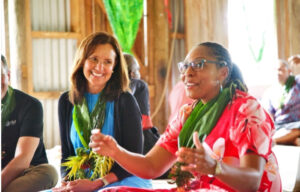
Growing up in Kansas in a large, practical family, the international stage seemed far away. While Professor Spahn would receive snippets of the world from her great-uncle, who was a Catholic missionary in Papua New Guinea, she never set foot east of the Mississippi until she headed to college in Washington, D.C.
“Being in D.C. was such a tremendous learning experience,” she said. “Suddenly, you’re surrounded by people from all over the world. It really broadened my perspective.”
Her practical roots led her to a degree in accounting, followed by a job offer with KPMG after graduation. But everything shifted during that last summer before she started, when she saved up for one of those “live on $4 a day” trips. It was meant to last only five weeks, just in time for her to start her new career. Instead, she found herself in Southern Turkey, standing at a public pay phone, calling KPMG to ask if she could postpone her start date. That call marked a turning point.
“I wanted to learn more,” she said, “as a global citizen and not as a tourist.” She later applied to the Peace Corps and was placed in Romania, just four years after the fall of the Berlin Wall. During her time there, she witnessed an entire nation’s economy shift from state-run systems to private enterprise, an experience that revealed both the challenges and opportunities of global transformation.
From there, her career spanned international finance, nonprofit leadership, and eventually her return to the Peace Corps — first as a country director, then as agency head. Each pivot, she said, was shaped as much by circumstances as by design.
“Life really is a series of turning points,” she reflected. “Oftentimes, you don’t control them. Family, health, global events - all shape your path. But if you stay open, each step can be a moment to learn and grow.”
Lessons in Leadership
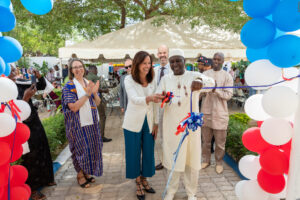
Former President Biden appointed Professor Spahn to be Acting Director of the Peace Corps during the pandemic, and she was unanimously confirmed by the Senate. The Peace Corps’ continued existence is owed, in part, to her leadership when there were no volunteers in the field. “Any disruption, especially large-scale disruption outside your control, forces you to ask: how do we maintain relevance?” Professor Spahn asked. “How do we move forward?”
Professor Spahn answered that question by mobilizing the entire agency around reimagining service, advancing equity, and delivering quality. Every employee had a role to play.
“For our back-office teams,” Spahn said, “we asked how we should standardize and streamline to improve efficiency. For our programmatic teams, we asked how we could contribute to the COVID response and be ready for a new reality when borders reopened. Importantly, we were intentional about maintaining our relationships and relevance around the world.”
Under Professor Spahn’s leadership, the Peace Corps streamlined operations, launched virtual service opportunities, mobilized staff to support in-country COVID responses, and even deployed volunteers domestically for FEMA’s vaccination rollout. Now, Spahn is eager to translate these lessons to the classroom.
Shaping the Future Together in Denver

After decades of experience in finance, service, and international development, she is thrilled to begin this new chapter in Denver. Not only is she bringing her experience into the classroom, she’s also joining a community that holds significance for her family. Her daughter is a proud alumna of the Korbel School, making this next step personally and professionally meaningful. “When she started here, we got to know Colorado and the school,” Spahn said. “I was so impressed by the caliber of education she received and the welcoming community. Korbel has a tremendous reputation, and its vantage point in the West gives it a unique voice outside the Beltway.”
For Spahn, her return to Korbel is about more than teaching; it’s about building alongside students and colleagues during a moment of transition.
“There’s no playbook for where we are right now,” she said. “But that’s what makes this such an interesting time. The disruption is here. What matters is how we respond and reinvent.”
Professor Spahn will share more insights from her career in leadership and international development during the inaugural Dean’s speaker series event at Korbel. Don’t miss your chance to attend “Meeting the Moment: Leadership in a Turbulent World,” on Thursday, September 18, where she’ll join Dean Fritz Mayer for a fireside chat about navigating times of upheaval with resilience, adaptability, and purpose.
For Aidan Smith (MA International Development, 2025) and his fellow AmeriCorps interns at the Korbel School, the classroom is just the beginning. From supporting veterans to building connections with refugee communities, they’re gaining something no textbook can offer: the experience of leading with empathy, urgency, and vision.
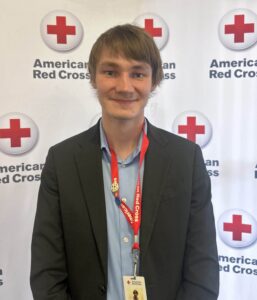
The AmeriCorps internship program at the Josef Korbel School of Global and Public Affairs places students into meaningful, funded roles across public and nonprofit organizations, where they complete approximately 450 hours of real-world work that complements their academic training. For Aidan, it was exactly the kind of opportunity he hoped Korbel would provide.
“What I was most excited for when I came here was to attend community events or to serve,” he said. “I think it's been a really good balance of doing community work while also building professional experience.” Through AmeriCorps, that vision quickly became reality.
This year's cohort of six graduate students is serving with the American Red Cross, the African Community Center, and Food Bank of the Rockies. Their roles range from helping newly arrived refugees navigate systems to supporting veterans and their families. In return, students receive a living allowance, an education award to apply toward tuition or student loans, and course credit toward their degree.
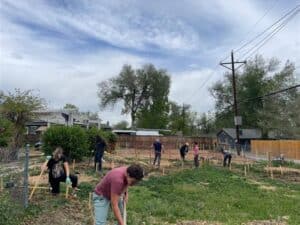
But the return goes far deeper than financial or academic. For those involved, it's a chance to apply their training to urgent community needs and grow into the kind of public leaders they came to Korbel to become.
Placed with the American Red Cross Mile High Chapter, Aidan supports outreach and programming for veterans and military families across Aurora and neighboring areas. In his first few months, he conducted a detailed community needs assessment, an experience that helped him build both his research and communication skills. From there, he began forging connections with local nonprofits to develop responsive, community-driven support programs. One such collaboration, with the Heartlight Center, has led to the creation of workshops dedicated to supporting veterans and military families with grief support counseling.
"When I started AmeriCorps, I probably wouldn't have felt confident about that kind of outreach," he reflected. "But over time, I picked up knowledge from team meetings and just got more comfortable in those spaces."
Beyond the programs he's helping build, Aidan stays deeply involved in hands-on volunteer efforts, whether it's tidying up a veteran's yard, joining social events at VA centers, or organizing recreational activities like bocce ball or mocktail socials. "That's definitely been rewarding. Every time I go to one of those events, the person we're helping is super grateful. It's great to see the direct impact."
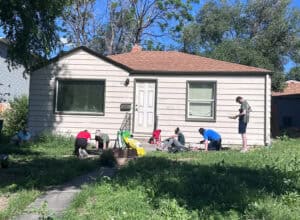
Abigail "Abby" Russell, a Korbel alumna and regional program manager at the American Red Cross, witnesses firsthand the energy and impact Korbel students like Aidan bring to the AmeriCorps program. She supervises Aidan and the other interns, consistently impressed by their professionalism and readiness. "Anyone that comes from Korbel — expert-level report-making," she joked, marveling at how quickly the interns dive into meaningful work. But for Abby, the passion Korbel students bring isn't just about skills. It's a shared commitment to humanitarian values. "The passion they bring is on another level. It's something I haven't seen in a long time."
But their passion doesn’t stop in the field. As part of the program, AmeriCorps students choose between two required courses, one of which is the Social Impact and Sustainability Lab, a hands-on class that channels their internship experience into the classroom taught by adjunct professor Janney Carpenter. Designed more like a consulting practicum than a traditional class, the course places students on project teams supporting real-world nonprofits, building skills in strategy, research, and impact design. Carpenter emphasizes a learn-by-doing approach. "You don't design good solutions in a conference room,” she said. “You get out there and talk to people.” That hands-on approach equips students with tools to think strategically, act iteratively, and navigate complexity, skills that transfer across sectors.
Though AmeriCorps is a national program, students like Aidan emphasize how unique the Korbel partnership feels. "I think AmeriCorps recognizes the potential of Korbel students. Everyone I've worked with is capable, committed, and genuinely wants to make an impact," he said. "It's hard to break into places like the Red Cross. These internships can get hundreds of applicants. I honestly don't think I would've gotten this position without Korbel and AmeriCorps."
For students like Aidan, the AmeriCorps Internship Program is more than a line on a resume. It's the beginning of their career in leadership and public service. For Aidan and his peers, it's also a rare chance to test themselves, serve with intention, and learn what kind of leaders they want to become.
To further support this pathway into public service, the Korbel School is proud to offer a new scholarship exclusively for AmeriCorps alumni applying to Korbel graduate programs. This initiative recognizes the experience and values AmeriCorps members bring and helps make a Korbel education even more accessible. Learn more about the scholarship and how to apply here.
Join us for the first conversation in the Dean's Speaker Series, featuring Korbel Rice Family Professor of the Practice and former Peace Corps Director, Carol Spahn. Dean Fritz Mayer and Carol Spahn will sit down for a fireside chat to discuss an array of topics relating to current public and global affairs.
This reflection was written by Ahmad Saleem (MA, International Security, 2025), one of four students selected to represent the Josef Korbel School of Global and Public Affairs at the 2025 Aspen Security Forum.

From July 15–18, I had the privilege of representing the Josef Korbel School of Global and Public Affairs as part of a student delegation at the 2025 Aspen Security Forum. As the only university partnered with the Forum, Korbel’s presence stood out—we were proud to be the only students attending among a distinguished gathering of world leaders, policymakers, and experts in global security.
The forum was insightful, exposing me to a wide range of opinions on pressing global issues. A recurring theme throughout the event was the growing role of artificial intelligence and cybersecurity in international security. In the session Cracking the Code: AI and National Security, we heard from Tarun Chhabra, Head of National Security at Anthropic and Distinguished Visiting Fellow at the Hoover Institution, Stanford University, and Katrina Mulligan from OpenAI for Government. These speakers, representing both public and private sectors, discussed how AI is poised to transform the security landscape. As an international security student, I was deeply intrigued by these discussions.
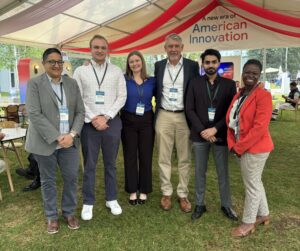
Another recurring theme was the future of European defense. A powerful session on this topic featured Baiba Braže, Minister of Foreign Affairs of Latvia. Following the discussion, our Korbel delegation had the privilege of engaging with the Latvian delegation, who kindly invited us to the upcoming Rīga Conference. Korbel also hosted a session at the Forum titled Russia, Ukraine, and Beyond. This session explored the geopolitical and defense implications of the Russia-Ukraine war and featured a remarkable lineup of speakers: Dr. Condoleezza Rice—Korbel alum and former U.S. Secretary of State—Pasi Rajala, Political State Secretary for Finland’s Foreign Ministry, and Halyna Yanchenko, Member of Ukraine’s Parliament and Head of the Investment Taskforce for the Defense Industry. The discussion emphasized the enduring importance of transatlantic partnerships and the need for sustained global support for Ukraine. It was a proud moment when Dr. Condoleezza Rice recognized Dean Fritz Mayer and the Korbel School for organizing the session.

The forum also came at a pivotal moment for Middle Eastern geopolitics. The session titled Israel at a Crossroads featured Amos Yadlin, former Chief of the IDF Intelligence Directorate, and Michael Herzog, former Israeli Ambassador to the U.S. and Tisch Distinguished Fellow at the Washington Institute for Near East Policy. They discussed Israel’s evolving strategic posture and described its military doctrine as one of “short, decisive, and limited war.” I appreciated that the forum also provided an alternative narrative through Dr. Vali Nasr’s book talk on Iran's Grand Strategy: A Political History. His presentation offered a deep dive into Iran’s domestic politics and its shifting strategic paradigms. Dr. Nasr argued that, in contrast to Israel’s doctrine, Iran’s strategy is oriented toward long-term, less decisive conflicts. These sessions together provided a comprehensive and nuanced understanding of regional dynamics.
One of the most fascinating sessions for me was Great Power Competition – Global POVs. This panel offered compelling perspectives from the Global South and included speakers such as Hina Rabbani Khar, Former Foreign Minister of Pakistan; Claudia Ruiz Massieu, Former Foreign Minister of Mexico; and Balázs Orbán, Political Director to the Hungarian Prime Minister. It was especially insightful to hear how different regions interpret great power dynamics—and why including these voices is crucial for shaping inclusive global policy.
Outside the formal sessions, I, along with other Korbel students, was invited to informal networking opportunities. These provided a chance to connect with professionals working in tech, defense, and government. As someone who aspires to work in think tanks, especially in Washington, D.C., I was excited to meet individuals from the Atlantic Council, Aspen Institute, Center for a New American Security, and Delphi Global. Many of them were already familiar with the Korbel School and expressed willingness to support me and my fellow students in our career journeys. Beyond these professionals, I also met a Stanford graduate who had recently founded an AI company supporting semiconductor development. These connections helped me not only network professionally but also draw inspiration from fellow academics and innovators.

I returned from Aspen with a new perspective on global security issues and a wealth of connections. I truly felt that this opportunity, along with the Korbel School, provided a bridge between theoretical knowledge and real-world practice. I am deeply grateful to Dean Fritz Mayer, Prof. Naazneen Barma, and the Scrivner Institute of Public Policy for providing this opportunity. Experiences like this are a powerful reminder of how the Korbel School continues to empower students like me to connect academic learning with real-world policy and practice.
Copyright ©2025 University of Denver | All rights reserved | The University of Denver is an equal opportunity institution